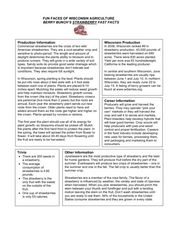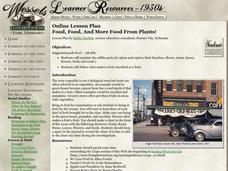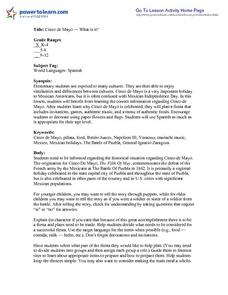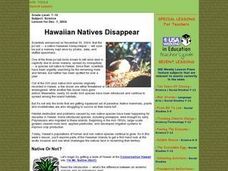Curated OER
How Plants Spice Up Our Lives
Third graders study plants. In this biology lesson plan, 3rd graders label and identify parts of plants, identify spices obtained from plants, and determine what part of a plant a spice comes from by using taste, touch, smell and sight.
Curated OER
Insects Are Helpful!
Students see that insects do lots good and are very valuable to humans and nature. This is part of an ongoing effort to dispel fears of insects. They rotate through a series of centers that have examples of how insects contribute to our...
Curated OER
Dress Up a Twig
Students study the structure and function of the parts of a winter twig. They determine how to identify trees using the twigs.
Curated OER
Fun Faces of Wisconsin Agriculture: Berry Bunch's Strawberry Fast Facts
Learners use facts about strawberry production in Wisconsin to complete math and art activities. In this strawberry production instructional activity, students read about strawberry production in the state of Wisconsin. They answer math...
Curated OER
Food, Food, And More Food From Plants!
Students examine the edible parts of a plant and explore their function. They define what makes a fruit classified as a fruit. They create a sketch or map or photo of a 1930s farm and justify their plant selections.
Curated OER
Science: Bees: An Interdisciplinary Approach
Students investigate the world of bees and describe their characteristics. by identifying the bees' parts, they demonstrate how these parts function. In the lab, students dissect bees and view the various parts under microscopes. ...
Curated OER
Cinco de Mayo - What is it?
Students, after examining why the fiesta Cinco de Mayo is celebrated, plan a fiesta that includes invitations, games, music, paper flowers, flags and a menu of authentic foods. By completing this assignment, they enhance their education...
Curated OER
Seasons--Autumn (fall)
As part of a discussion of seasonal words, class members identify words relating to autumn and then identify the language used to describe what happens during this time of year.
Curated OER
A Wild Chain Reaction
Students explore habitats. In this habitat lesson, students break into groups and are labeled as a part of a habitat. Students then do an activity with yarn that shows how all of the parts are connected and depend on each...
Curated OER
Hawaiian Natives Disappear
Students explore parts of the Hawaiian Islands to get a examine the exotic invasion, and see what challenges the natives face in reclaiming their territory. They identify the changes in the environment that have been the hardest on the...
Curated OER
Seed Sensation
Students explore seeds through dissecting, sorting, comparing and contrasting. They draw their observations of both a closed and open seed and then they label the parts of a seed. They brainstorm where seeds come from. They compare seeds...
Curated OER
It's Challenging Being Green!
Students influence the plant life cycle as they take care of plants.In this caring for plants lesson, students understand the parts of the plant and their functions in keeping it alive. Students participate in experiments with plants and...
Curated OER
Too Bee Or Not To Bee
Students recognize that bees are important in the reproduction of plants and to the survival of animals. In this bee lesson, students become familiar with the parts of bees and how those adaptations help them pollinate plants....
Curated OER
Review of the Five Senses
Students investigate the five senses. In this human biology instructional activity, students are given five items and identify which items match best with each of the senses. Students use objects such as a rock, hard candy, and a flower.
Curated OER
How a Pumpkin Grows
In this picture story pumpkin worksheet, students color and cut apart 6 parts of the story of pumpkin growing from planting the seed to eating pie. This could be used to sequence a story.
Curated OER
Science Drawing
In this drawing in science activity, students read about what is needed to complete a drawing in order to communicate ideas and discoveries in science. Students analyze a drawing of a volcano and indicate the problems with the drawing....
Curated OER
Saved by a Shark
Students explore the marine ecosystem and the importance of sharks. For this shark lesson, students look at photos of the Flower Garden Banks National Marine Sanctuary and discuss the animals that live there. They discuss which animals...
Curated OER
Elaine Humphrey, Gwynne Thompson
Second graders become familiar with the parts of the microscope and how it works. In this microscope lesson, 2nd graders experiment with different light and settings. Students answer questions based on their experiment.
Curated OER
Creeping and Crawling Observing Mealworms and Earthworms
Students observe the inherited traits in earthworms and mealworms. In this organisms lesson plan, students view a live mealworm and earthworm on a tray and identify the body parts. Students measure the worms and observe the behavior....
Curated OER
The Dirt on Plants
Students draw and label the four parts of a plant. They describe changes that are part of the common life cycle. Students follow various one and two step directions. They are asked to discuss that they can recall about plants.
Curated OER
Growing and Harvesting Fruits and Vegetables
Students learn the various parts of a farm and what is grown on a farm. They also match fruits and vegetables to locations where they are grown.
Curated OER
Growing Jack and the Beanstalk Plants
First graders investigate how plants grow by growing their own "beanstalk", (after reading "Jack and the Beanstalk") and record their observations daily in a science journal.
Curated OER
Stem Cuttings
Learners select the best non-flowering stems of plants and remove the leaves from the soon to be buried portion of the stem. They fill seedling flats with soil and insert the cuttings, label, and water.
Curated OER
BEE a Part of Our Community
Young scholars reflect how to form a respectful classroom community. In this communities instructional activity, students construct a "community web" of positive comments and predict what happens to the web when negative comments are...
Other popular searches
- Flower Parts
- Parts of Flower Worksheet
- Flower Parts Diagram
- Flower Parts and Functions
- Flower Parts and Pollination
- Science Flower Parts
- Flower Parts Vocabulary
- Games for Flower Parts
- Flower Parts Art
- Songs and Flower Parts
- "Flowers" Parts
- Flower Parts Dissection

























